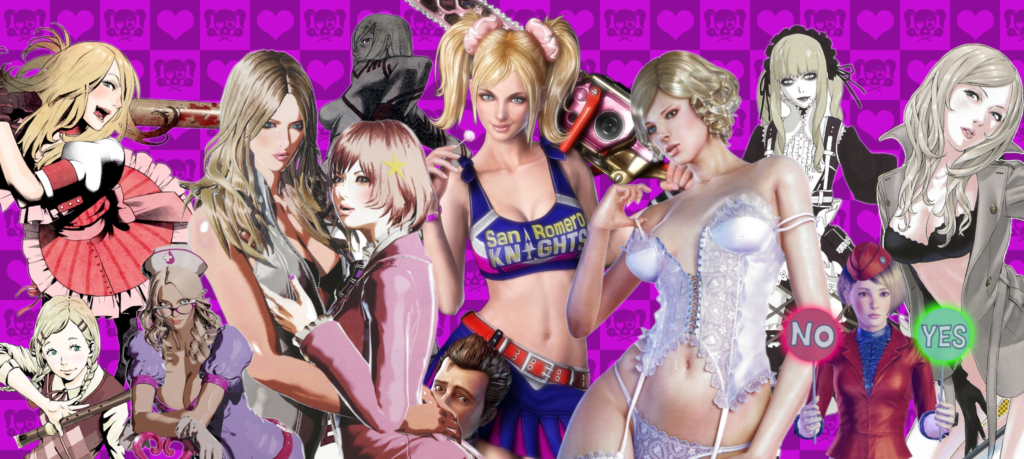
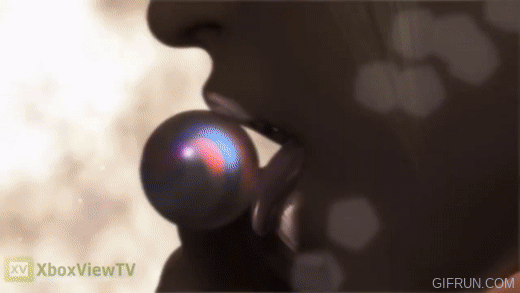
Grasshopper’s next big project was first hinted at in October of 2010, when GhM’s partnership with Kadokawa Games was announced by its president, Yoshimi Yasuda.
Kadokawa was, at the time, trying to get their footing in the gaming market, and producing Suda’s comedic, “stylish action” game was going to play a part in their expansion.
The game was ultimately revealed in July of 2011 as Lollipop Chainsaw, a comedy-horror pastiche in which 18-years-old ditsy cheerleader Juliet Starling hacks and slashes her way through a zombie apocalypse with her trusty chainsaw.
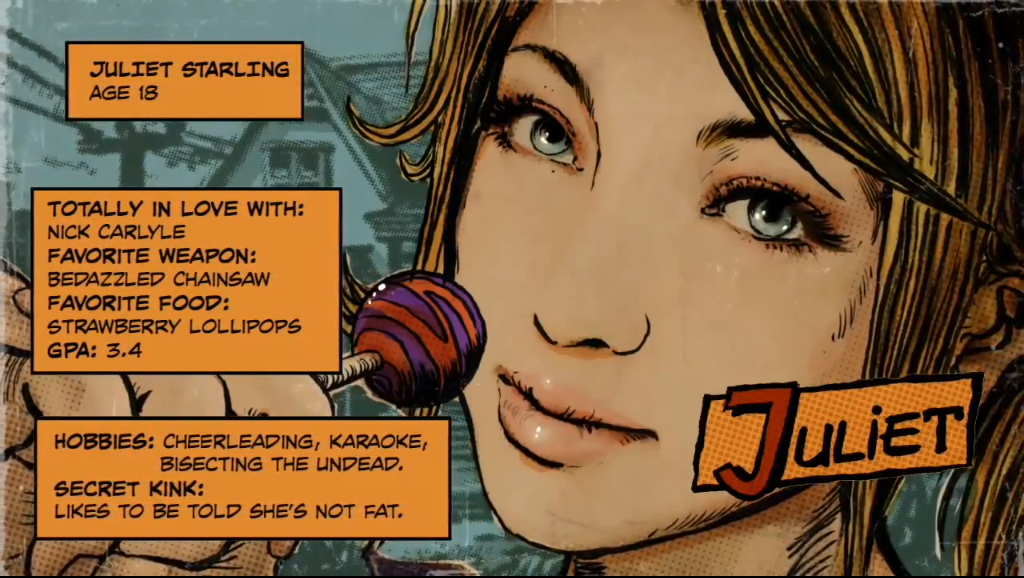
Juliet hails from a family of monster hunters, a secret she had managed to keep until, one morning, she found her high school infested with zombies. In order to save her boyfriend Nick, who had been bitten and infected, she severs his head with a magic ritual. As she carries his head around by strapping it to her belt, the two will banter during gameplay in a manner not at all dissimilar from what Grasshopper did with Garcia and Johnson in Shadows of the Damned.
Through the course of the game, it is revealed that the zombie apocalypse was initiated by Swan, a meek goth incel who, jealous of the fact that Juliet was getting plowed by her chad boyfriend on the daily, decided to open a portal to the netherworld to bring forth the Dark Purveyors, putrefying stereotypes of several music trends.
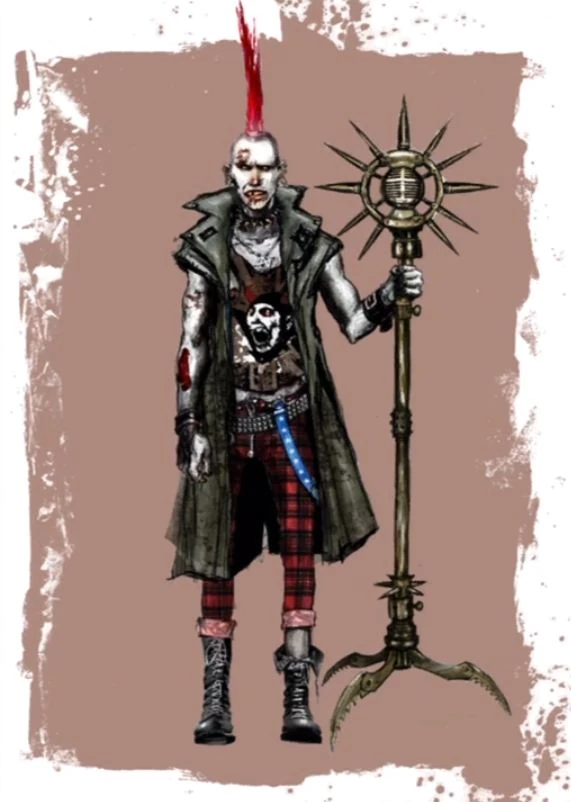
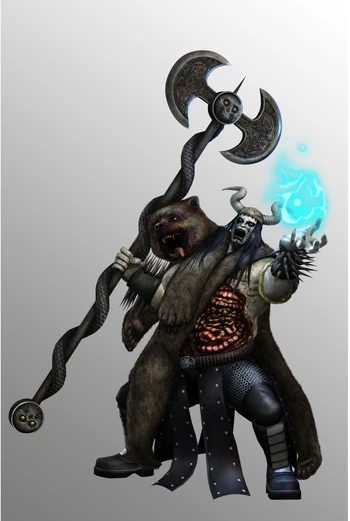
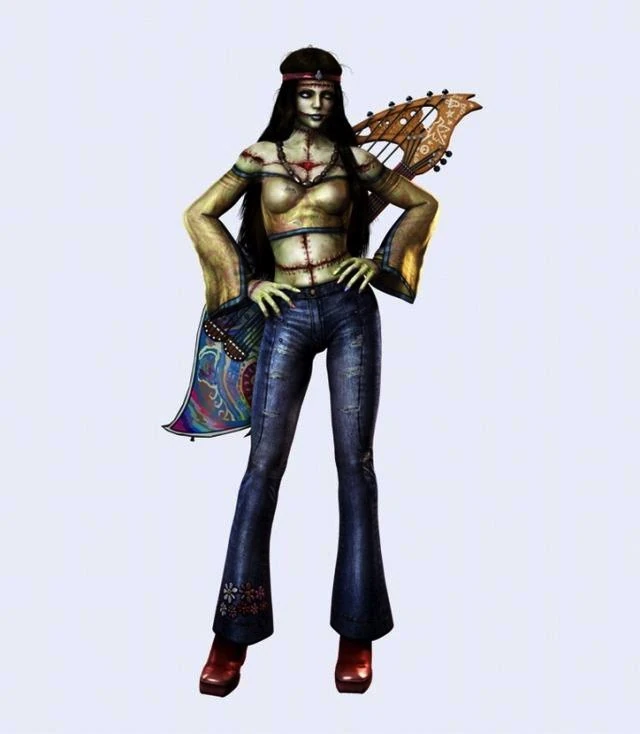
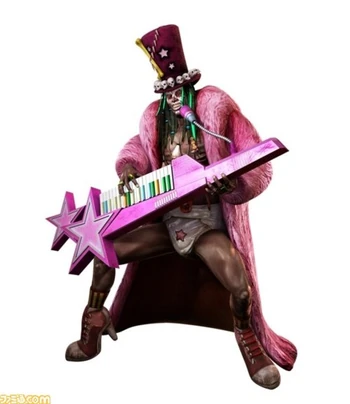
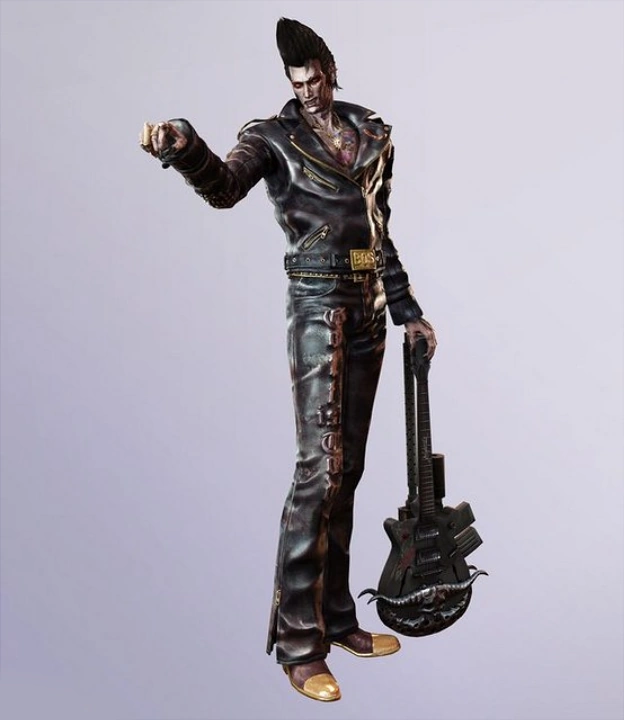
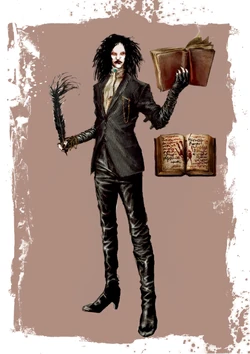
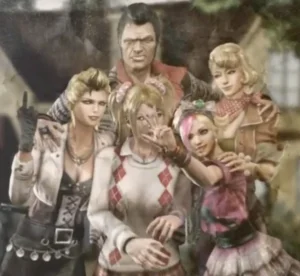
In the end, thanks to the help of her panty-sniffing teacher Morikawa and her quirky family, Juliet manages to put a stop to the zombie invasion by defeating a giant zombie Elvis Presley called Killabilly. Nick’s humanity is restored but at the cost of living the rest of his life as a manlet.
As was routine at this point, Suda drafted the proposal and was credited as Creative Director, while Tomo Ikeda, who served as Boss Designer for Shadows of the Damned, took on directorial duties. As was also par for the course, Ikeda left the company immediately after.
The scenario was penned by Masahiro Yuki, who also served as co-producer. That would be his final contribution to GhM, before leaving the company the following year during the GhM/Planet G split. He was, surprisingly, accosted for this job by American filmmaker James Gunn, who served as creative consultant.

Lollipop Chainsaw was, at the time, Grasshopper’s biggest production, with international backing from American entertainment titan Warner Bros. As such, they could work with a much higher budget than usual and enlist the help of several international celebrities, the first of which was Gunn.
Nowadays he is mostly known for directing the Guardians of the Galaxy films and threatening to produce an unending barrage of other garbage superhero movies under Warner Bros., but at the time, Gunn was still known as a fringe filmmaker who had made his bones under Troma, a production company notorious for its focus on vile and gory horror-comedies, who had only dipped his toes into the mainstream by writing two Scooby-doo live action films in the early 2000s.
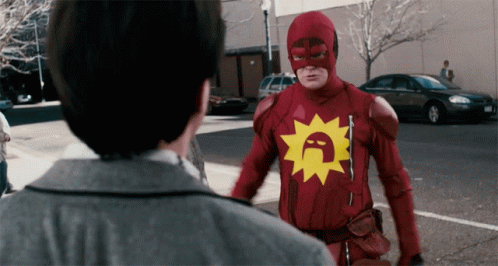
His latest movie at this point was Super, a dark comedy in which a retarded man, after being left by his wife for a drug dealer, is overcome by delusions and decides to become a superhero who kills people by bashing their heads in with a wrench for minor infractions. He later enlists the help of a teenage superhero fetishist who rapes him.
His work on Lollipop Chainsaw is, by comparison, a lot tamer, but he still managed to adapt and expand the game’s brand of humor in a way that would be appealing to western audiences, helped by the more universal appeal of horror pastiche and pop music, as opposed to the more insular gamer humor of previous Blondes Era titles. He is still enamored with his work on the game to this day, referencing it as late as 2021 in his dogshit movie “The Suicide Squad”.
On the Japanese side of things, cutscenes were directed by Yudai “You Die” Yamaguchi, also known for his bizarre brand of horror, who would later gain some notoriety in the west through his participation to the anthology movie “The ABCs of Death”.
Characters were designed by illustrator NekoshowguN, and several manga artists provided additional costumes for Juliet: Rei Miyamoto and Saeko Busujima, known for “Highschool of the Dead”, Shiro, known for “Deadman Wonderland”, Manyu Chifusa, known for “Manyu Hiken-cho” and Haruna, known for “Kore wa Zombie desu ka?” all designed costumes that would reference their own works, all revolving zombie or horror lore.
The same was true for the soundtrack: While Akira Yamaoka served as Music Director, the largest part of the soundtrack was comprised of extremely popular licensed tracks, with the original compositions being handled by Digimusic Ltd. and HAL.
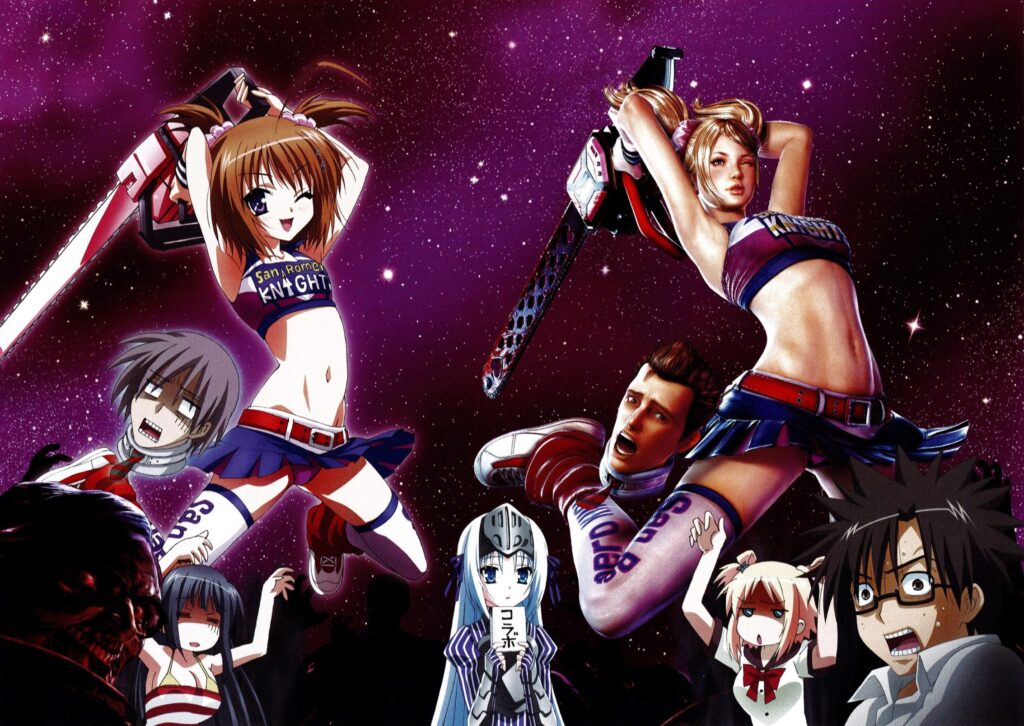
Most notably, electropunk singer and alleged piss fetishist pedophile Jimmy Urine, who also voiced the Dark Purveyor Zed (unrelated to Xed51), provided original songs for each of the main boss encounters and took part in promoting the game, describing it as “totally fucking crazy”.
There isn’t much to say about gameplay: Lollipop Chainsaw is a linear hack-and-slash, where the player goes through levels by hacking zombies and other supernatural creatures. Some depth is given to the combat by implementing hand-to-hand combos, which serve the purpose of stunning enemies, with the scoring system and the in-game shop being tied to executing as many enemies as possible in one swing.
Along the way, the player is tasked with rescuing civilians, with failure to do so resulting in a bad ending. While the in-game shop allows purchase of extra combos, costumes, music tracks and so on, the game contains no other side objectives or optional gameplay scenarios. It does, however, mitigate repetition by including several semi-interactive set pieces and by capping off each level with a boss fight, sometimes implementing Quick Time Events during cutscenes, a first for GhM.
After releasing in June of 2012, Lollipop Chainsaw quickly became Grasshopper’s best selling title, with over a million copies sold over eighteen months.
Its success was, of course, dictated by its broader appeal, with its focus on pop music and zombie pastiche, but it was also helped by the massive marketing campaign that Warner Bros. and Kadokawa afforded the game, something that EA did not provide for Shadows of the Damned.
Efforts were made to turn Juliet Starling into a household name: high-profile voice actors were chosen for her, with Tara Strong, which you may know as Kaede Smith and Twilight Sparkle in that fucking pony cartoon, voiced her in the US, while the Japanese version had Eri Kitamura (Saya Otonashi from Blood+, among others) playing Juliet in the Xbox360 version, and Yoko Hikasa (Saki Nagatsuka from Ro-Kyu-Bu!) played her in the PlayStation 3 version.
At the same time, professional cosplayers were hired to impersonate the character. Jessica Nigri, known for being Jessica Nigri, became the face of Sexy Juliet in the west, while American-born Japanese model Mayu Kawamoto, known for being the face of Cutie Juliet in Japan, became the face of Cutie Juliet in Japan.
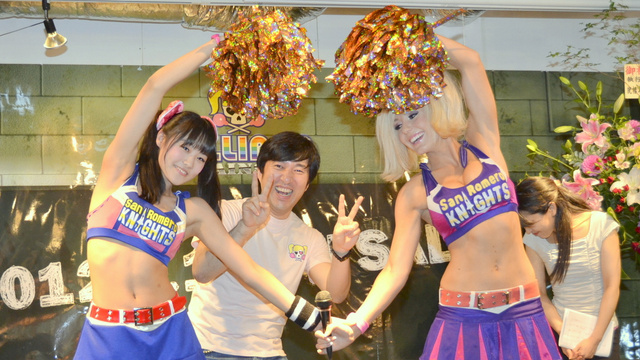

Obviously, as was the standard at this point of the company’s history, the sex appeal of Juliet was extremely played up in advertising: the game featured many skimpy outfits for her, which were heavily featured in promotional materials. Her obsession with lollipops, which colors the entire presentation of the game, is obviously meant as an allusion to oral sex. Jessica Nigri was even kicked out of PAX East for wearing an official costume that was provided to her by her employers who hired her specifically to advertise the game.
For this reason, the game was slammed by the wrecking ball of sexism: was Juliet’s portrayal as a panty-flashing cocksucker sexist? Is the game itself sexist? Are the game developers sexist for making it? Stupider questions have been asked in the history of mankind, though rarely. We are indeed blessed, as James Gunn actually felt it was important to give a response to these accusations, carrying on the legacy of cannibal serial killer Jeffrey Dahmer as he stated, during his trial, that he was not a racist. Unsurprisingly, his comments quickly veered towards his attraction to male ass:
(…)
“Nick is objectified by Juliet — he’s literally turned into an accessory, a commodity, and his humanity is denied. Nick is not only emasculated, he is SUPER emasculated. He starts off as this cool high school jock, and he thinks his girlfriend is this demure cheerleader, and then discovers she is a thousand times tougher — that is, more traditionally ‘masculine’ — than he’ll ever be. And, on top of that, he loses his body and penis (which is just sort of the straw that broke the camel’s back).”
(…)
“But I think it’s important people don’t confuse sexuality with sexism. There is nothing in the game, ever, that makes females somehow less than males. To be honest, I think a lot of the criticisms of LC‘s ‘sexism’ are really coming from a place where the secret message is sex is bad, sexual attraction is bad, lust is bad. I was raised Catholic: I get it. Yes, Juliet Starling is hot as hell. And, yes, that probably helps to sell copies of the game. But my question is, so what? How in the world does that convey that women are less than men?”
“If you’re saying that Juliet Starling is, like Barbie, an impossible ideal that makes women feel bad about their own bodies in comparison well, okay. You have a point there,” he continued. “But welcome to NEARLY EVERY SINGLE THING IN POP CULTURE EVER. I am an avid reader of Marvel comics and, believe me, Wolverine’s ass makes me feel shitty about my own ass in comparison. Wolverine has got a tight, hot ass. If I watch the Bachelorette and those dudes take their tops off and every one of them has amazing pecs — yeah, that makes me feel like crap as well.”
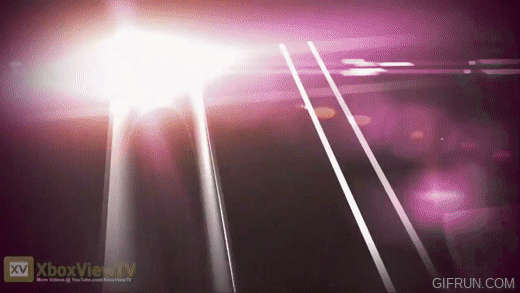
Just like with Shadows of the Damned, Suda’s name was utilized quite extensively during advertisement of the game, and in the same way, he actually had little to do with the finished product: the proposal for a humorous action game starring a chainsaw-wielding cheerleader came from him, specifically citing Army of Darkness (known as Evil Dead III: Captain Supermarket in Japan)’s brand of humor as an inspiration. He did put together the team that worked on the game, especially in regards to his personal friendship with Yudai Yamaguchi, but the elements that brought Lollipop Chainsaw to success were the end result of a collaborative work of other artists, namely James Gunn, Masahiro Yuki, the aforementioned Yamaguchi, NekoshowguN, Jimmy “Old enough to piss, old enough to kiss” Urine and the many musicians whose songs were licensed for the game.
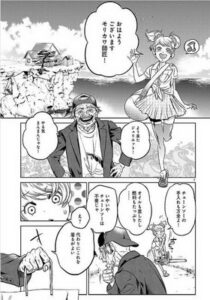
Because of the sheer amount of outside influence on the project, Lollipop Chainsaw ends up feeling more of a contract job than actual licensed titles like Samurai Champloo and One Night Kiss; a competent product, but one that is not representative of the talent of GhM’s team. When mixed with the constant use of Suda51’s name during advertisement, this ended up further diluting the company’s brand identity.
Due to high sales, the game ended up being re-released in Japan the following year, on February 14th, in a special Valentine Edition box set including a series of extras. Its release was also accompanied by the single-volume collection of the Lollipop Chainsaw manga, which had previously been serialized through the course of 2012 on Famitsu and Famitsu Comic Clear. The manga acted as a prequel to the game and it was drawn by debuting manga artist haru.

The game still retains something of a following to this day, a full decade after its initial release, with Juliet Starling being a popular subject of cosplays (both professional and amateur, for we live in a doomed world where the words “professional cosplayer” are uttered without shame or regret) and a very active modding community which has inserted her garments in pretty much every game that would allow it.
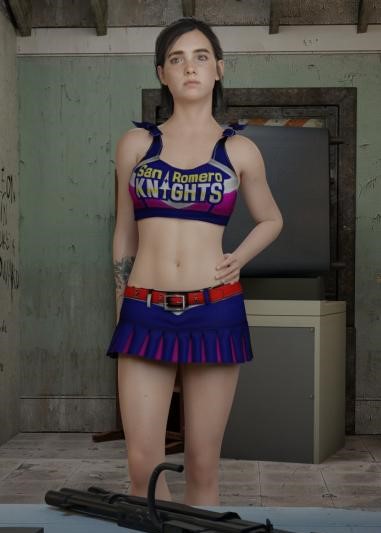
However, its success would not reflect on Grasshopper in a significant way, either positively or negatively: the brand was fully owned by Kadokawa and Warner Bros., meaning that GhM would not receive cuts of the sales, and as we already discussed, the game was not exactly representative of Grasshopper’s previous work, meaning that a Lollipop Chainsaw fan was unlikely to resonate with brands they fully owned, such as The Silver Case, or partially owned, such as No More Heroes.
In May of 2022, Yoshimi Yasuda split from Kadokawa Games to found a new company, Dragami. About half of the intellectual properties previously held by Kadokawa Games were acquired by the new company, which included Lollipop Chainsaw. In January of 2023, a remake of the game was announced, and in August of 2023 its title was revealed as Lollipop Chainsaw RePOP, to be released in the summer of 2024. Suda and James Gunn are uninvolved with the project.
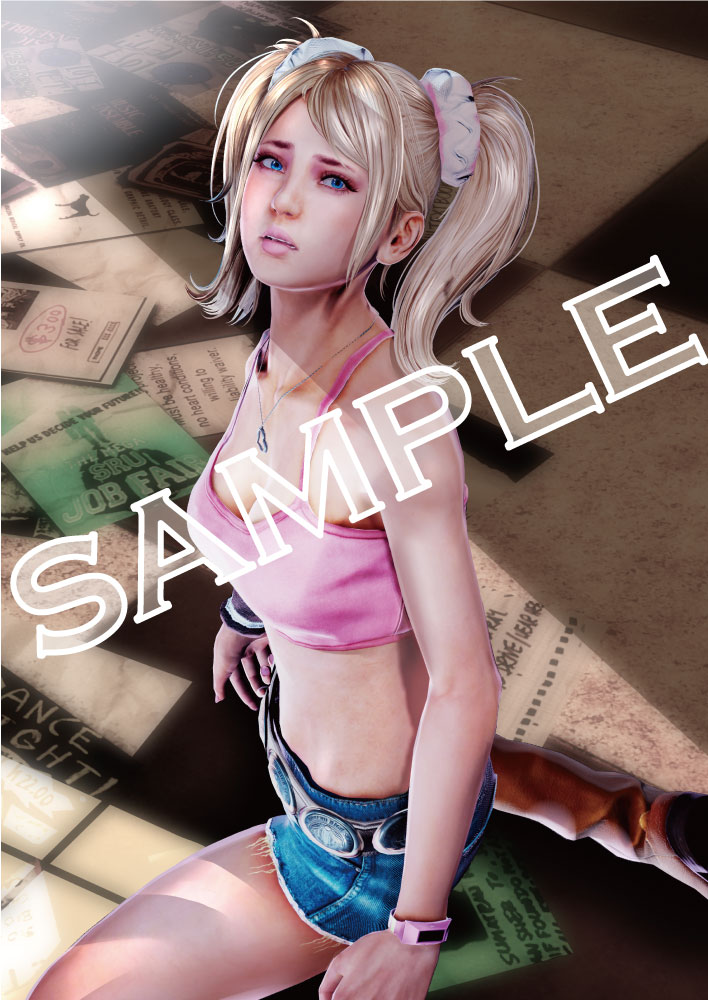
Despite RePOP being advertised as a straight remaster, the game actually features a number of changes: for one, it has been completely retextured, aiming for a more realistic look. This, in conjunction with the new lighting and physics (a result of porting the game from Unreal 3 to Unreal 5) gives the title a completely different look. Secondly, due to the rights expiring, certain songs had to be excluded from the soundtrack and the unlockable costumes based on other properties had to be replaced with original ones. Jimmy Urine’s voice has also been removed from the English track, replaced by Stuart O.
RePOP also features some additions, with a new mode which further hides the violence behind another layer of on-screen pop-ups, customizable hair colors and chainsaw models, and a whole new Japanese voice track for Juliet in which she is played by singer Yoko Hikasa, which is included alongside the other three pre-existing tracks.
The remake released on September 25th 2024 on PlayStation 5, Xbox Series S/X, Nintendo Switch and Personal Computers, with a variety of different store pre-order bonuses including posters where Juliet stares upwards in tangible distress and anxiety.
